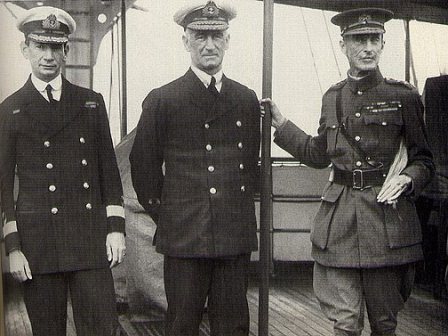20 August 1915
General Sir Ian Hamilton, Headquarters, Mediterranean Expeditionary Force - On 20 August, as the IX Corps prepared for one last desperate attack at Suvla on 21 August, Hamilton was also pondering the thorny question of whether the Navy should launch a renewed attack on the Straits.
 Photograph: General Sir Ian Hamilton (right) with Roger Keyes (left) and Sir John de Robeck.
Photograph: General Sir Ian Hamilton (right) with Roger Keyes (left) and Sir John de Robeck.
"De Robeck came over at 4 pm, by formal appointment, to talk business, and deadly serious business at that! He has heard, by cable I suppose, that the people at home will see him through if he sees his way to strike a blow with the Fleet. He takes this as a pretty strong hint to push through, or, to make some sort of a battleship attack to support us. De Robeck knows that when the Fleet goes in our fighting strength goes up. But he can gauge, as I cannot, the dangers the Fleet will thereby incur. Every personal motive urges me to urge him on. But I have no right to shove my oar in—no right at all—until I can say that we are done unless the Fleet do make an attack. Can I say so? No; if we get the drafts and munitions we can still open the Straits on our own and without calling on the sister Service for further sacrifice. So I fell back on first principles and said he must attack if he thought it right from the naval point of view but that we soldiers did not call for succour or ask him to do anything desperate: "You know how we stand," I said; "do what is right from the naval point of view and as to what is right from that point of view, I am no judge." The Admiral went away: I have been no help to him but I can't help it. Hardly had he gone when Braithwaite (who had heard what was in the wind by a side wind) came and besought me to try and induce the Admiral to slip his battleships at the Straits. All the younger men of war are dying to have a dash, he said. That's as it may be but my mind is clear. If a sailor on land is a fish out of water, a soldier at sea is like a game cock in a duck pond. When de Robeck said on March 22nd he wanted the help of the whole Army that was quite in order. He would not have been in order—at least, I don't think so—had he said in what manner he wanted the Army to act after it had got ashore. We are being helped now by the Navy; daily, hourly: we could not exist without the Fleet; but it is not for me to say I think the battleships should or should not take chances of mines and torpedoes."
That day he also attended the burial of Captain Charles Collet the RNAS pilot whom as we saw was killed in a tragic accident on 19 August.
"In the morning I attended the funeral of young Collet, killed yesterday so tragically. A long, slow march through heavy sand all along the beach to Kephalos; then up through some small rocky gullies, frightfully hot, until, at last, we reached a graveyard. The congregation numbered many of the poor boy's comrades who seemed much cut up about his untimely end."
"SOURCE:
Sir I Hamilton, Gallipoli Diary, Vol.II, (Edward Arnold: London 1920), pp.124-126.
